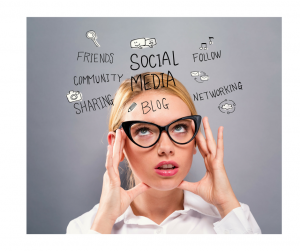
The recent internet sensation; the kiki/keke challenge has got me thinking about social media yet again. It is amazing that a video shot not too long ago by an American comedian has become a global phenomenon with over 500,000 posts (and counting) for #InMyFeelingsChallenge hashtag on Instagram. Yes, this isn’t the first time something like this has happened and certainly won’t be the last but it is a reminder yet again of the reach, influence and power of social media. Thanks to the digital world we are more connected, informed and engaged but we are also more pressured to keep up with trends; be it a trend to follow a certain fitness regime, or be eating a certain diet, or be risking our lives for a meme. Trends, good and bad, existed even prior to social media but what’s different now is how fast things start trending and the large crowds they attract. Thanks to smart phones, information penetrates every waking moment of our lives and lures us into following rapidly changing trends.
Living in the digital world means that we are constantly plugged in both in our professional and personal lives. Disconnecting from work and maintaining a work/life balance has become difficult because there are no set work hours for a lot of people and there are expectations to work from anywhere anytime. We have become “multi-taskers” believing that we can be present with our partner/friends/children at a dinner table while we engage with people in the virtual world. We mindlessly scroll through feeds on Instagram and Facebook to fill our time because sitting still and letting our minds wander is no longer considered an option. We say we use social media to connect, to belong, to keep up with what’s happening in people’s lives but we also inevitably end up comparing our lives with others. Social comparison isn’t new but the number of humans we compare ourselves to has grown exponentially. We look at the carefully crafted and filtered lives of others, some of whom we would perhaps never meet, and experience emotional responses that range from admiration, inadequacy, inspiration, envy, sadness, self-loathing, happiness, loneliness, self-doubt, anger, and anxiety.
While research on connectivity in the digital world and its impact is still relatively limited and mixed, we know that it most certainly has an effect on our emotional and psychological health. Media Psychology is an official sub-specialty in the field of psychology that examines the impact of media and technology on human behavior. Recent studies have validated the reality of Internet Addiction Disorder that can cause symptoms (nausea, tremors, shivers, anxiety) similar to other addictive disorders.
A study conducted in 2015 shows that one third of the participants were not only addicted to their smartphones but they were also not aware of how addicted they were. Another study looked at the use of Facebook on mood and found that the participants felt worse after using it. A follow up experiment showed that people were stuck in the cycle of repeated use because they expect and believe that using it will make them feel better but, in fact, it did not. This kind of thinking and behavior is typical in other types of addictions. On the other hand, it is important to note that not all social media use is bad. There is also research that shows that online social networks allow people to reach out and comfortably share and express themselves. Another recent study shows that young adults with depression are using the internet and social media to connect and talk about their personal experiences with each other.
It is true that we all use technology differently and hence the impact of it is different for all. Social media is a powerful tool that has the ability to organize, create, inspire, influence people and bring about meaningful change. We have seen its power at the Women’s March in cities all over America, the #Metoo movement and the revolution in Egypt among some other positive examples. But we have also seen a rise in cyberbullying, social isolation, mental health problems (stress, depression, anxiety, self-esteem issues), decreased productivity, FOMO, social comparison, and risky behaviors.
As our personal and social spaces become increasingly digital, we need to remember that social media and digital technologies in and of themselves are not the problem, it’s how we choose to consume them. Remember that YOU are the boss of your technology and not the other way around.
The key is to be a mindful consumer;
- to be cognizant of the content being consumed,
- to identify goals (e.g. improve relationships, success at work, personal development) and organize content viewing and connectivity accordingly,
- to evaluate use periodically to see if you are still on track with using it to meet your goals,
- to be aware of the emotions it stirs in you when you use it,
- to recognize and acknowledge what personal need you are trying to meet (instant gratification, love, boost self-esteem),
- to create boundaries around the amount of time you spend on it daily,
- to give yourself permission to take a break from it from time to time and enjoy living outside the digital world.
Maria Mirza is a therapist at Colliance Wellness. If you would like support in prioritizing and taking care of your emotional health and well-being, contact Colliance Wellness and see how therapy can help.
